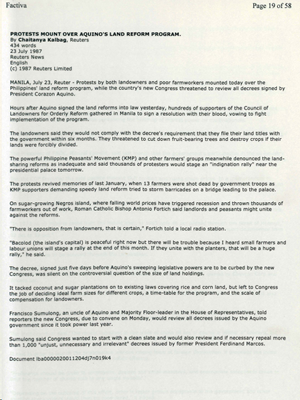ROW INTENSIFIES OVER PHILIPPINE OIL PRIVATISATION
[Reuters]
Published date: 23rd Jul 1987
23 July 1987
Reuters News
English
(c) 1987 Reuters Limited
MANILA, July 23 – A row over the proposed privatisation of Petron Corp, a fully-owned subsidiary of the Philippine National Oil Co (PNOC), intensified as the Committee on Privatisation (COP) said overwhelming arguments favour the sale.
PNOC’s board of directors last month opposed Petron’s sale, saying its profits financed energy development projects, helped the government maintain a strategic foothold in the oil industry and provided first-hand information on industry costs, thus preventing the build-up of market power by multinationals.
The COP recommended Petron’s privatisation on April 15. It said up to 40 pct of Petron could be sold to foreign investors while the government would retain a 25 pct stake.
The President of PNOC, Manuel Estrella, said last month that the government’s participation in the oil industry “gives it useful information that enables it to keep prices within reason as well as minimises the possibility of a supply failure.”
But the COP favoured the sale despite Mideast Gulf tension and rising crude prices. In a memorandum to President Corazon Aquino, a copy of which was obtained by Reuters, it said there was little chance of a return to the oil crises of the 1970s.
OPEC‘s share of world -supply was down to 34 pct, and seen rising to only 43 pct by 1995, and Philippine oil consumption had dropped to 47 million barrels in 1986, 27 pct lower than the 1973 level of 64 million barrels.
“In 1973 all oil imports came from the Middle East; in 1985 only 48 pct passed through the Strait of Hormuz,” the COP said. “Our policy of domestic resource development has reduced our energy import dependence from 92 pct to 52 pct.”
It said even if a fresh crisis arose, PNOC could repeat a tactic from the early 1980s, requiring 50 pct of all crude purchases to be sourced through the corporation.
Petron is the only locally-owned oil company. The others are Royal Dutch/Shell Group’s Pilipinas Shell and Caltex (Philippines) Inc, a subsidiary of Caltex Petroleum Corp, which is jointly owned by Chevron Corp and Texaco Inc.
The COP said an oil-sharing agreement with the Association of Southeast Asian Nations (ASEAN) could also cushion shocks.
ASEAN groups the Philippines, Indonesia, Singapore, Thailand, Malaysia and Brunei. The COP said the agreement would come into effect if any member nation‘s crude supply dropped by 20 pct.
The memorandum said “The recent increases in the price of crude oil are of course a matter of concern, but our ability to influence the situation is totally unaffected by Petron’s ownership status.”
It said in order to launch the privatisation without raising fears of foreign domination, it proposed the initial sale of Petron shares be made through a public offering.
“Preference should be given to employees, dealers and small investors, and appropriate safeguards taken to limit the number of shares sold to any single investor.”
“Depending on the outcome of this effort, other investor groups acceptable to the government and other existing shareholders would then be considered,” it added.
The COP also referred to a study on Petron’s privatisation carried out by Citicorp of the U.S. “Petron’s projected profits calculated by its management … would be nowhere near the real profit levels of the recent past, “It said. “In fact, Petron’s own capital spending program in refinery improvements would result in negative cash flows from operations for 1987 and 1988, the period which coincides with the heaviest funding needs under the (government’s) Medium Term Development Plan.”
The COP also noted that of a total expenditure of 18.9 billion pesos on energy resource development from 1973 to 1985, the private sector accounted for the bulk, 64 pct.
It said even if the sale of 40 pct equity to foreigners went through, the government would remain the largest single shareholder and thus be in a position to control operations.
It added the government fixes wholesale and retail prices as well as hauling and shipping rates of oil products, regulates refinery capacities, controls the opening and closure of service station outlets, approves individual crude cargoes and requires periodic financial and operating reports from all companies.
“From a policy standpoint, there is an inherent anomaly in making an industry participant like Petron a part of the regulatory process; it gives rise to potential conflicts of interest,” the memorandum said.
Petron, which represents the combined operations of Petrophil Corp, Bataan Refining Corp and Petron TBA Corp, is the country’s largest commercial enterprise in revenue terms.
Gross revenues in 1985 for Petrophil were 18.72 billion pesos, for Petron TBA 182.3 million pesos and for Bataan Refining 11.71 billion pesos.






